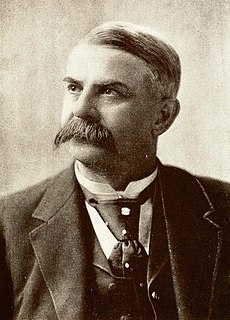A Quote by Robert Louis Stevenson
Vanity dies hard; in some obstinate cases it outlives the man.
Related Quotes
Trench says a wild man is a willed man. Well, then, a man of will who does what he wills or wishes, a man of hope and of the future tense, for not only the obstinate is willed, but far more the constant and persevering. The obstinate man, properly speaking, is one who will not. The perseverance of the saints is positive willedness, not a mere passive willingness. The fates are wild, for they will; and the Almighty is wild above all, as fate is.
Weakness is a great thing, and strength is nothing. When a man is just born, he is weak and flexible. When he dies, he is hard and insensitive. When a tree is growing, it's tender and pliant. But when it's dry and hard, it dies. Hardness and strength are death's companions. Pliancy and weakness are expressions of the freshness of being. Because what has hardened will never win.
Most people dislike vanity in others, whatever share they have of it themselves; but I give it fair quarter, wherever I meet with it, being persuaded that it is often productive of good to the possessor, and to others who are within his sphere of action: and therefore, in many cases, it would not be altogether absurd if a man were to thank God for his vanity among the other comforts of life.
The day is not far distant when the man who dies leaving behind him millions of available wealth, which was free for him to administer during life, will pass away unwept, unhonored, and unsung, no matter to what uses he leave the dross which he cannot take with him. Of such as these the public verdict will then be: The man who dies thus rich dies disgraced. Such, in my opinion, is the true gospel concerning wealth, obedience to which is destined some day to solve the problem of the rich and the poor.
I'm interested in the ongoing war between the individual and community. That inner dissent against whatever group is surrounding you. No one wants to cede their selfhood to a group, right? And yet no one can exactly live outside the group, either. Even the most obstinate survivalist probably lives in some telepathic communion with all the other obstinate survivalists out there in the woods.







































